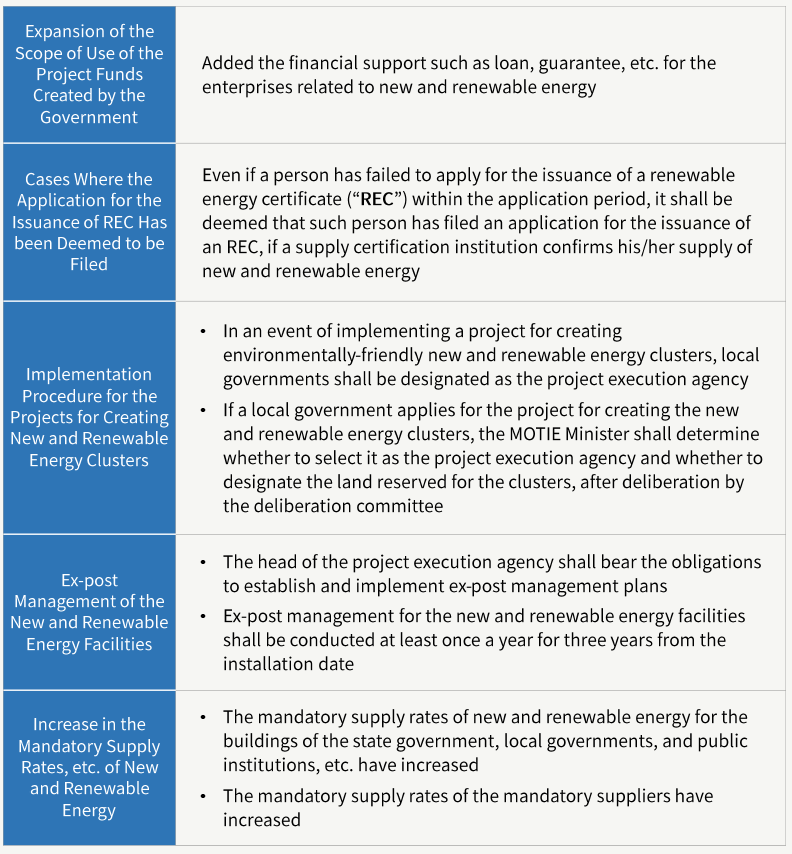The main amendments to the Enforcement Decree of the Act on the Promotion of the Development, Use, and Diffusion of New and Renewable Energy, which has become effective as of October 1, 2020, can be summarized as follows:

Amendments to the Enforcement Decree of the Act on the Promotion of the Development, Use, and Diffusion of New and Renewable Energy Including the Increase in the Mandatory Supply Rates of the Mandatory Suppliers Has Become Effective as of October 1, 2020
The partial amendments to the Enforcement Decree of the Act on the Promotion of the Development, Use, and Diffusion of New and Renewable Energy (the “Enforcement Decree”) have become effective as of October 1, 2020. The amendments to the Enforcement Decree was made to close the loopholes in the former Enforcement Decree. In particular, it is notable that the amendments to the Enforcement Decree has clarified the ex-post management procedures for the new and renewable energy facilities and has increased the mandatory supply rates of new and renewable energy. Below is a brief overview of the amendments to the Enforcement Decree:
The Act on the Promotion of the Development, Use, and Diffusion of New and Renewable Energy provides for the government to appropriate project funds for the technology development, use, and distribution of new and renewable energy and enumerates the purposes of the funds. It is noteworthy that the Act delegates some of the purposes of the funds to the Enforcement Decree. In accordance therewith, the Enforcement Decree defines the scope of projects eligible for the use of the funds created by the government. Through the amendments, now the funds may be used to provide ‘financial support such as loan, guarantee, etc. for the enterprises related to new and renewable energy’.
Meanwhile, according to the former Enforcement Decree, the new and renewable energy suppliers who intended to obtain an REC were required apply for the issuance of an REC within 90 days from the date of supplying new and renewable energy (the “Application Period”), without any exception. However, under the amended Enforcement Decree, even if a supplier has failed to apply within the Application Period, if it is confirmed that he/she has supplied new and renewable energy within the Application Period, it shall be deemed that he/she applied for the issuance of the REC as of the last day of the Application Period. Such amendment allows the supplier who failed to apply within the Application Period to obtain the REC.
The MOTIE Minister may conduct distribution projects if deemed to be necessary to facilitate the use and distribution of new and renewable energy. Such distribution project include the projects for creating environmentally-friendly new and renewable energy clusters (the “Clusters”), and the amended Enforcement Decree made it clear that a local government shall be designated as an project execution agency when a project for creating the Clusters is implemented. In addition, the amended Enforcement Decree provides for a series of procedures that: (i) the head of the local government which intends to be appointed as the execution agency of the project for creating the Clusters shall establish a development plan and submit the plan to the MOTIE Minister; and (ii) the MOTIE Minister shall designate the project execution agency after deliberation.
Furthermore, the amended Enforcement Decree specifies that the head of the execution agency of distribution projects shall establish and implement plans for ex-post management of new and renewable energy facilities, and prescribes that the constructor who installed new and renewable energy facilities shall conduct ex-post management for the new and renewable energy facilities at least once a year, for three years from the installation date.
When it comes to the buildings newly built, extended, or remodeled by the state and local governments, public institutions, and government-contributed corporations, it is required to use energy supplied by new and renewable energy sources for a certain percentage of the expected energy consumption of such buildings, which was computed as at the time of their design (the “Mandatory Supply Rates”). The Amended Enforcement Decree increased the Mandatory Supply Rates as follows:

Meanwhile, power generation businesses, etc. (the “Mandatory Suppliers”) are required to supply at least a certain amount of electricity from new and renewable energy sources (the “Mandatory Amount”), and the Amended Enforcement Decree increased the percentage of the Mandatory Amount per year, which is used to calculate the Mandatory Amount of the Mandatory Suppliers, to 9% in 2021, and to 10% after 2022.
To sum up, it is notable that (i) the standards for the application for the REC issuance for the new and renewable energy suppliers have been eased, (ii) the constructors of new and renewable energy facilities are required to pay attention to the ex-post management, in particular, for the facilities that have been installed within the past three years; and (iii) the Mandatory Suppliers are required to supply new and renewable energy in accordance with the increased Mandatory Amount.
Jipyong News|Legal Updates
Partially-Amended Enforcement Decree of the Act on the Promotion of the Development, Use, and Diffusion of New and Renewable Energy Has become Effective as of October 1, 2020
2020.12.14



